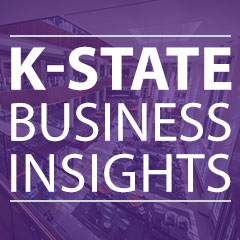September 12, 2018
New study explores corporate social responsibility
Submitted by Brent Fritzemeier

Will frontline service workers' perceptions of corporate social responsibility increase the perceived meaningfulness of their work while decreasing the corrosive effects of dysfunctional customer behavior on their job performance?
As the point of customer contact for firms, frontline service providers frequently interact with unfriendly, demanding, and abrasive customers. Sometimes this behavior includes unwarranted complaining, anger and even rage from customers. Yet, service providers have the expectation to remain professional and courteous during these encounters. The stress and emotional exhaustion due to negative verbal comments and behaviors generally exhausts frontline service workers emotionally, which in turn decreases their motivation to perform their job — resulting in poor service performance.
Kansas State University associate professor of marketing Jaebeom Suh, along with this colleagues Jiyoung Kim, Cornell University; Hae-Ryong Kim, Konkuk University; and Russell Lacey, Xavier University, examine the negative effects of customer aggression and frontline employee’s job performance in a recent study published the Journal of Service Theory and Practice. The study, "How CSR impact meaning of work and dysfunctional customer behavior," explores whether corporate social responsibility can alleviate the negative effects of problem customers and consumer misbehavior. Generally, the study investigates whether service providers perceptions of corporate citizenship behavior helps them cope with the workplace stress as a result of difficult customer behavior.
Using data from a large insurance company in South Korea, the results indicate that frontline service providers' perceptions of corporate social behavior decrease their perceptions of aggressive customer conduct. Further, aggressive customer conduct increases the emotional exhaustion of service providers. The study also finds that perceptions of corporate social responsibility increases service providers' view that they are engaged in meaningful work, which in turn increases job satisfaction.
Practical implications for business
Firms should not underestimate the power of positive corporate social behavior.
- Corporate social responsibility resonates even with the firm's frontline service providers by decreasing workplace stress resulting from interactions with aggressive customers.
- It increases service workers' perceptions of the meaningfulness of providing quality customer service.
